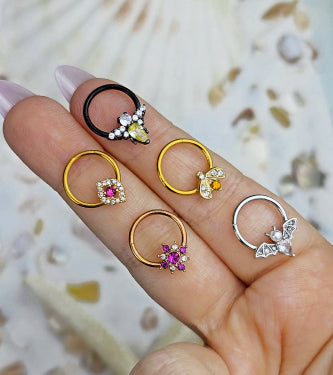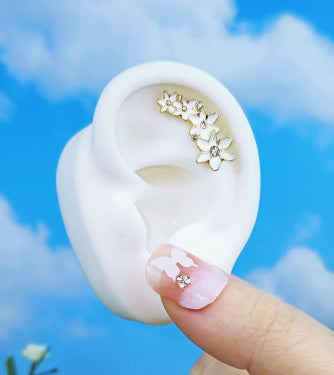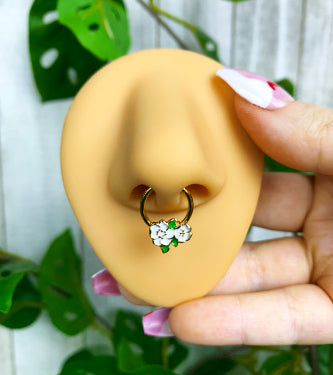For anyone who’s interested in getting dermal body art, or already has a dermal piece that they’re looking to purchase parts for, there’s a few key points that can make the experience a whole lot easier. Stick with us, and your next dermal purchase will be a piece of sparkling cake.
First you’ll need to know exactly what type of dermal you have (or want to get). There are four main styles of dermal piercing: microdermal, trans-dermal, sub-dermal, and skin diver. Microdermals are by far the most common, and as such enjoy the highest jewelry availability. These are the type of single point piercing where your modification artist uses a hollow needle or dermal punch to create a hole in the skin, and then inserts a base with a small protrusion, so that only the decoration attached to the base is visible above the skin’s surface. Because this type of dermal consists of two separate parts that are attached, the decorative portion can be removed and replaced. That piece is called the “dermal top.” The other half of the item that rests underneath the skin should only be removed when the piercing is no longer wanted or needed, and is known as the “dermal anchor” or “dermal base.”
There are a few different styles of microdermal base, some that are solid, and others that may have one or more holes. The holes are used to help the base heal into the skin so that the piercing remains static and the jewelry isn’t easy to move or accidentally tear out.
The other common type of dermal piercing is the skin diver. Skin diver piercings are a lot like microdermals in that a single hole is made and some jewelry is then inserted. The big difference though is that skin diver jewelry is actually just one solid piece. Rather than consisting of connected parts, the skin diver is shaped like a barbell, with no protrusion at the base. The item is inserted with the decorative end left above the surface, and as such cannot be changed without being completely removed. For this reason skin divers are often used to create a temporary dermal designs, as they are relatively easy to dislodge afterwards.
Trans-dermal piercing is the creation of a microdermal type piercing through a surgical process which involves making a small incision a short distance from the piercing site and inserting the base of the item through that channel. Because the larger base isn’t being forced through the piercing hole, the result is an extremely clean look and a quick heal. And the last type of dermal art, sub-dermal piercing, isn’t really much of a piercing, per say. Instead of perforating the skin in order to leave a decoration at its surface, the sub-dermal jewelry is left completely underneath. Because the jewelry will heal beneath the skin, this is usually best performed with simple shapes like stars, hearts, loops, or horns.
So now that you know exactly what you’re going to need, it’s time to get working on that beautiful dermal masterpiece. Happy piercing!







